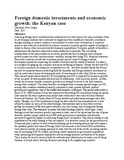| dc.description.abstract | Attracting foreign direct investment has continued to be a vital concern for many countries. More so, developing countries have continued to supplement their insufficient domestic investment through working to create a conducive environment to attract more investments. A country's power is also reflected in its ability to enhance increased economic growth capable of raising its output to finance other recurrent and development expenditures. Economic growth is therefore a phenomenon that has been subjected to many studies by economists. The overriding consideration of the many studies on economic growth has been to analyze how economic growth impacts on other macroeconomic variables, among them being FDI. Empirical literature from other countries reveals that economic growth may be coined to bring economic development positively improving the welfare of society and the wealth of nations. It is also a key variable for gauging the economic and social wellbeing of nations. Despite the fact that FDI is critical in economic development, an analysis over the . last three decades shows that Kenya has lost its competitiveness in attracting both the domestic and foreign domestic investment as well as noted loss in terms of retaining its stock of investments to other East African countries.
This research paper had an objective of investigating how FDI is impacted by economic growth of the recipient, its determinants and direction of relationship . with economic growth. In other words, do investors consider economic growth in an attempt to invest in the host countries among other variables? The study therefore investigates how economic growth impact on FDI among other variables considered namely; openness to trade, growth domestic product, government expenditure, size of the market and domestic investment. The period under study is from (1970- 2009) because Kenya has experienced fluctuating FDI investment during the period. Data used for the study captures only period under study and it was collected from National Bureau of Statistics, the Central Bank of Kenya website and publications amongst other data banks. Though, one of the limitations of using the data collected was inconsistencies, it was refined to ensure accuracy of the study findings.
Data analysis used in this study involves, getting the summary of the descriptive statistics, unit root testing, and cointegration testing among other tests. This was done to ensure that study findings could be relied upon. Study findings reveal that economic growth, openness to trade, size of the market and the size of gross domestic product impact positively on FDI while government expenditure and domestic investment negatively impact on attracting foreign direct investment. This was according to null hypotheses of the study leading to their acceptance.
It is therefore critical for the government of Kenya and policy makers to work towards initiating and accelerating policies that will improve the quantity, quality and value of Foreign Direct Investments in the overall GDP contribution. Such policies include increasing openness to trade with the rest of the world, increasing market size by increasing GDP Per Capita, instituting control measures on government expenditure while promoting development expenditure and increasing domestic investments of its people. There is also the need to invest in both the soft ands hard infrastructure to reduce cost of doing business in Kenya which will stop factories relocating to the neighboring countries. | en_US |

